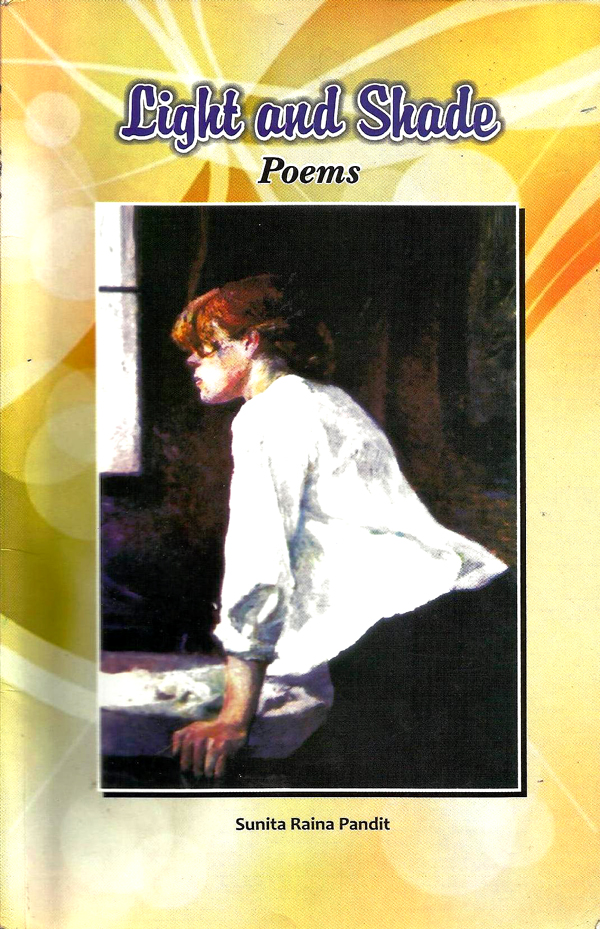Dr. K B Razdan
Name of the Book : “Light and Shade: Poems”
Author : Sunita Raina Pandit.
Publisher : Vaibhav Prakashan, Sahibabad [UP] INDIA
Pages : 93
Price : Rs 250
Arvind Gogoo, like his earlier English translations of Kashmiri diasporic poets, this time as well, renders the translated version of the author’s Kashmiri poetry into a transmogrified version of his own reckoning. In the “Translator’s Note” Gogoo says: ” I resorted to compression reconstruction and recomposition”, allowing the “architecture and linguistic nuances of the original to suffer.” He frankly observes that he has “subverted without worrying about exactness, fidelity and accuracy of equivalence.” Not only this, he goes on to admit that his translated version of Sunita Raina Pandit’s original poems in Kashmiri into English has “ruined the syntax, metre and richness of the original Kashmiri. Here, again, this writer is reminded of the famous English romantic poet Shelley’s oft quoted words regarding ” the inherent fallacy of translating poetry”. To put it succinctly, the poetic odyssey of Sunita’s mind and soul as presented across the poems in the English version, can only be taken as the translator’s own self-reflexive detotalization of poetic creativity. Nothing can be more reflective of a poet’s decentered world in which the very status of aesthetic experience has been demolished with ruthless efficiency, if only to exhibit the translator’s own caliber as a transcreating virtuoso.
As it is, the fifty-five poems, all untitled, cumulatively constitute a mini-cosmos of the poet’s pot-pourri of pathos, longing, agony of separation, ephemeralization of the lover in poem after poem, and above all a striking similarity to the existentially blended poesy of the ancient Greek tragic poetess, Sibyll. From the very first poem to the last one, as the translated version version conveys, the poetess in Sunita exhibits an unflagging talent in dispersing the will of the one in order to act upon both self and the inner metaphysical landscape. Dispersal, diffusion, dissemination, diffraction, pulsion and Integartion, cohere the poems into a compendium of communication, interplay, interdependence and interpenetration of psyches and souls. A few quoted lines would amply illustrate this contention:
“Friend
Disappeared
And
Left me a restive pulsating heart………
Consciousness of non-existence
Is existence
My my-ness
Is
Nowhere.”
“Tears/flowed into nothingness/ He was cold granite/ The veil/ lifted/ to betray/ the secret.”
“Ash drips/Inside/smog reigns there………the bossom/touched/the depth.”
One can witness light nihilistic touches in these lines. In most of the poems the diction seems to be a travesty of the original Kashmiri, thanks to the no-holds-barred, transcreative enigma of the translator’s narcissistic acumen.The poetesses reversal of states, an oft repeated symptom of postmodern creativity can be seen in most of the poems. Here are a few samples to savour, wonder at and reflect about:
“What will bloom?
Lifeless wall/leans/against/lifeless wall/A block/ before air…”
“The past is etched on him./He carries water? In a willow basket/weeps blood/chases his memories/and/looks for the fountainhead/in the desert.”
Demonic imagery in these lines symbolizes the inherent futility of human existence.
Angst, anomie, ‘theft’ of the self, a Khalil Gibran type “distances and remembrances”, etc; inundate the rest of the poems in the translated, rather lacerating English version. Apocalyptic imagery reverberates in the lines now quoted.”
“Emptiness/is/inside truth…
Thought/the murder/enters
Ultimately/in the dark/doors
And windows/are/inside….
I want/ the short journey of/going/ and/coming/know the height of/knowledge/The measuring rod/is wrong.”
And again, the abstruse-cum-abstract diction replete with deconstructing symbols and metaphors, resounds loud and clear:
“Come and sit
I will unlid my heart
present wounded memories
And
Show you the gaps.
My heart caught fire
And
You darted.”
The concluding poems in the collection mark a transition from highbrow poesy to more lucid and communicative one:
“Laugh to entertain
To show your presence.
If you don’t laugh wear
A laugher’s mask…
Laugh
To make others ahed tears
We laugh laughs
To digest/to stomach.”
Pastoral and the spiritual, along with an admixture of theDivine and human world inundate the poems at the end of the anthology. These few lines amply illustrate this contention:
“You want to/adorn the sky/with Pearls?/You can’t reach./ The reasn Mind/ Pass through my heart/ You want to die/ after living the legend of life”
Echoes of Lala Arifa, Lal Ded, in othe words, become vividly predominant in one of the climactic poems:
“Am I?
Foe the fire
In each epoch?
I will jump into baker’s oven.
…
Shall I /Touch the heights of /
The woman mystic.
Long ago / I pulled the boat /
With / a thread / I shall change
The course of the river.”
…
Time is the change
Attitude is the change.
Faces are no-faces.
“They look away my ‘is’/and/denied
To me/ ‘mine’
The city/ is /the shameful gestures
Of/ my beautiful people.”
In conclusion, this writer feels that the translator has committed the creative impertinence of translating Sunita’s Kashmiri poetry, which, in the original rendering will be simply not translatable. Fidelity to the original, in poetic translations, is virtually impossible.
To commensurate with Gigoo’s tough and tasteless translation, the reviewer had no option but to maintain parity by taking recourse to vocabulary bordering upon the tapestry critical verbosity and ambiguity. “Light and Shade” as a oetic anthology, courtesy Gigoo’s translation, is well beyond the comprehension of the common reader from the academia. Only the highly scholastic intellectuals and poets in their own right, can derive any pleasure out of it.
(The reviewer is the former Head, Department of English, and Dean, Faculty of Arts, University of Jammu.)


